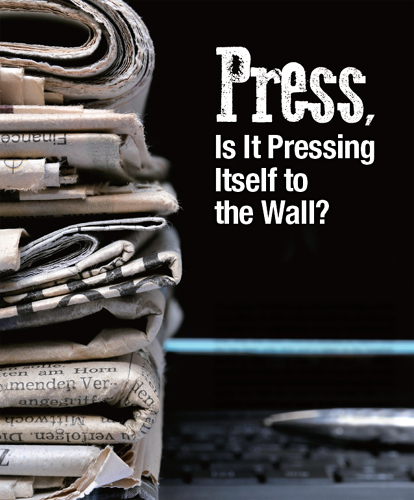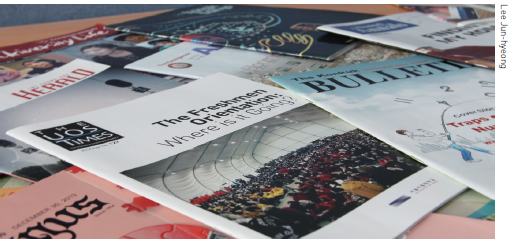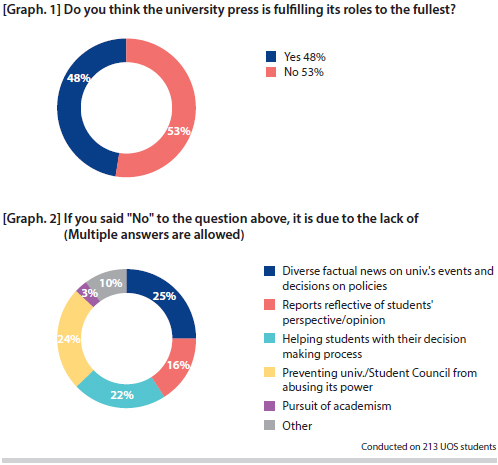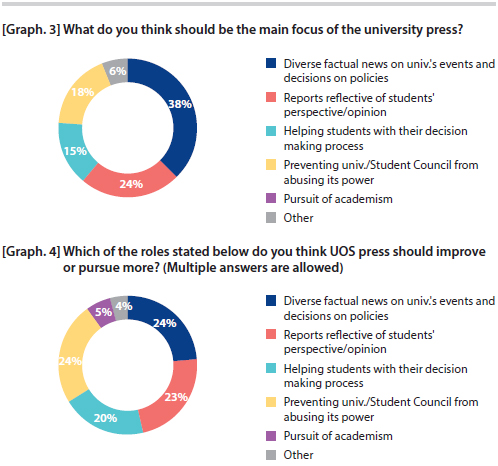
Thomas Jefferson, the second president of the United States of America, once said “Were it left to me to decide whether we should have a government without newspapers, or newspapers without a government, I should not hesitate a moment to prefer the latter.” If press does not exist, public will have no way of knowing about various events and happenings around the world and it would be hard for the people to know diverse matters that are directly related to their life and rights. Based on such importance and power the press has, it is no surprise that the press is often referred to “a monitor of society”, “a cane of society” or “the 4th power” following the legislature, judiciary, and executive.
As much tragic as the Sewol ferry incident was, what was even more tragic was the consequence of the press’ failure in carrying out its roles and responsibilities. The identity of press is essentially a medium ? for general presses, among the people and between them and government and for university presses, among students and between them and the university ? to better the communication among all members of the society. It is needless to say that such communication should be made based on the news or reports that are true; otherwise wrong information would be communicated within society.
The most prominent problem of the general presses reflected in the Sewol ferry incident was that they did not fully consider its responsibility of serving as a proper medium, and of delivering factual news or reports, which led to miscommunication. However, exactly which roles or functions have the general presses of Korea really failed to carry out, that led to the loss of public’s trust in the press? The UOS Times analyzed the roles and functions Korean general presses have overlooked which should be their responsibilities and suggested the roles and functions which the university presses should pursue as well.

Delivering facts and factual information is the most basic role of press. Press reports various events and governments’ decisions on policies, without making any kind of adjustments or having prejudice when reporting, because it is almost impossible for public to know every single policy change or happening in society. In this circumstance, press is one of the most reliable and critical information producers.
Information delivered by the press can be divided into two kinds. One is various events and accidents occurred within society. A report on the Sewol ferry incident can be an example of this. Simply reporting various events and accidents that took place in our society can be still very important and are often the ones that are needed to be reported with facts the most. The other one is policies. There are thousands of policies discussed and implemented by the government. Policy changes and legislation by the government are crucial subjects to be reported since these can directly influence the citizens’ lives. And by reporting mainly these two categories of information, the press fundamentally aims to satisfy the public’s right to know.
The general presses have, however, miserably failed to guarantee such public’s right, due to its false report on the Sewol ferry incident. They were constantly changing the number of dead or missing passengers of the ferry and reported that every passenger was safely rescued shortly after. This directly led to the loss of public’s trust in the general presses.

The press should not only deliver factual news, however. It should also be able to persuade society to adapt to the constantly changing circumstances of the society by interpreting and prescribing information about the environment beyond reporting the truth. These activities that evaluate and interpret subjects-to-cover assign the priority of them and execute agenda-setting function by suggesting interpretation and prescription of the changing environment.
Agenda-setting theory, confirmed by Maccom and Shaw in 1972, suggests that the degree of recognizing particular events of society has a high association with the amount of reporting (size of article, time of broadcasting) which press allots. It claims that the press can build the public opinion by decreasing and increasing proportion of the amount of its reporting arbitrarily.
In this sence, as it is almost impossible to report every single event and to let everyone know of every event taking place, selective reporting is essential. What the press chooses to do selective reporting on by putting an article about it on the first page of their newspaper, or broadcasting it on golden time can directly affect the formation of the public’s opinion. In this process, the press cannot help but using their own subjective point of view to choose which events to report. The press, thus, has a critical role in helping the public to consider and judge these events rationally and to take a proper stance on them.
Opinion and editorial articles can definitely become examples of such press’ role. Editorial articles represent one’s personal opinions about particular events and changing environment of our society. These articles usually criticize the problems with politics and economy of our society. Also they offer an interpretation on these issues with politics and economy which are often very hard for people to understand. A column or opinion article is a little bit different from an editorial article. In a column article, a writer reveals their subjective point of view and contains content full of personal emotions and feelings towards the subject they focus on to write about.
Although very different, editorial and column articles ultimately persuade the readers to have broader and reasonable perspective about these subjects they talk about. In other words, they directly affect the readers in the readers’ decision making and forming their own opinion. Thus, when the press is serving this kind of role, it has to have more responsibility to select and report the appropriate articles and devote itself to forming the rational public opinion.
3. Preventing an authoritative body from abusing its power
Vincent Blasi insisted that press needed an extended protection as they do a role of inspection equipment on governmental authority. He emphasized that the press is a unique organization in a private territory which can observe and inspect the corruption of public organizations. Such Blasi’s statement provides a basis for the press to have a role as a watchdog in our society.
The genuine power of the press comes from serving this watchdog role, as the press can often become the only subject which can directly criticize and publicize the wrongs the government and official or public organizations have done. Reporting corruption of high-ranking government officials and abuse of government authority can be examples. Social unjustness and lack of institutional legitimacy can also become the subjects the press should focus on, since the press has a role and duty to analyze and evaluate the irrationalities of our society, which can imply the failure of an authoritative body in doing its responsibilities for the people.
The irrationalities and social unjustness which can be seen in our society as a result of lack of an authoritative body doing its duties can be easily concealed and thus not known to the public. It should be the press’ responsibility to inform the public about these wrongs in order to protect prevent the authoritative body from abusing its power.
In addition, the press should also not merely convey the authority’s words on certain matters, but it should maintain its critical view and stance against it and try to pursue the truth and report the fact. This is why the press should become a watchdog, not a parrot or megaphone.


According to the survey [See Graph 1], about 53 percent of UOS students answered “No” to the question “Do you think the university press is fulfilling its roles to the fullest?” The main reason the university press is seemingly not serving its roles properly is attributable to the lack of diverse factual news on events and the university’s decisions on policies delivered (25 percent).
The importance of delivering different news about events and policies made at university comes from how the university press can provide diverse information on these in-depth compared to other sources. These other sources, from which the students can know about various matters at university, are mainly the university press, school website and SMS. The students, however, cannot receive every piece of information regarding school events and policies through school website and SMS and thus their right-to-know cannot be fully guaranteed. The school website only provides information on the events hosted or policies made by the university itself. SMS also has its limit on providing information in detail when it only can contain basic information that can be expressed with limited number of texts.
However, the university press can deliberately compromise the lack of diversity in information provided on school website and depth of the information delivered through SMS, because especially the university newspaper or magazine provides information on the events and policies made by both the university and students. The university press, for example, can cover student-oriented school events such as Daedongje or Yinhyangje or the news about increased student union fee, decided by the Student Council, all of which the students cannot be noticed of through school website.
Moreover, SMS provides only the most basic information that is extremely limited content-wise. For instance, if it were to deliver information on the recruitment of volunteers for a certain occasion, then it will likely to only state things such as the application date or ways to apply. However, newspapers and magazines can cover a particular issue extensively and deliver all the related information in detail.
The bottom line is, one of the roles and functions that the university press should focus the most is to cover and deliver in-depth information on various events occurred and policies made at school in order to eventually guarantee the students’ right to know. For this very reason, the fact that a large proportion of the students say that the lack of news delivered on these issues is the main factor causing the ineffectiveness of the university press suggests that it needs to immediately improve its role in this.
2. Forming rational public opinion among students
At the university, policies and decisions directly linked to the interests of the students are discussed and made several times a day. Then even though the assumption is that the university press fully fulfills the role of delivering diverse factual news about the events and policies at the university, if its role just stops there, throwing all these information for the students to deal with by themselves, it would be just telling them to analyze the information, make their own judgment and take their own stance accordingly all by themselves. The students themselves, without a doubt, should have the independent and final authority when it comes to make their judgment and take certain stance on the matters directly concerning their own interests. However, it is the university press’ role that, out of all the decisions and policies discussed and made at the university every day, it first decides which of these are more relevant and important to the students’ interests. It should, then, spend much more attention and time covering these matters that are more directly connected to the students’ own interests and rights, such as their education rights and welfare and scholarship system in order to convince them to pay more attention and have more active problem-solving attitude towards these matters.
The university press can more directly help form rational public opinion among the students as especially the university newspaper publishes editorial or opinion articles, which can be also found on the general press’ printed media. These editorial and opinion articles published by the university press, however, often hold more personal value and thus have more direct and influential impact on the students since these are written by the university students for student readers. The issues dealt in these articles are likely to be written with more student-oriented perspective and are more personally relevant to the students, who can sympathize more with these articles and possibly become affected by the opinions expressed in the articles. Through these editorial and opinion articles, the university press then is able to directly persuade the students to have certain rational and appropriate attitude or stance on some issues which need the students’ attention and interest.
3. Preventing an authoritative body from abusing its power
One of the most fundamental and important roles and functions of the university press should be preventing an authoritative body at the university from abusing its power. If the general press is responsible for covering whether the government’s policies and systems fully serve the people’s rights and interests or not, thus preventing the government from abusing its power, it can be understood that the university press is responsible for preventing largely the university and student council from misusing their power.
Universities are fundamentally places for the students’ education, but technically speaking, they are enterprises doing business at the same time. Although the concept of “profits” might differ from how the general enterprise would define it as, in a sense that the university also has to plan out policies and proposals on a budget to maximize its own profits and to compete with other universities and survive, it also is an enterprise. The problem is, since most of these Korean universities receive a lot of support fund from the government, it is hard for them to go against the government’s policies and sometimes it would have to support or carry out policies that are not reflective of the students’ interests.
In fact, some universities have recently either abolished or merged the departments or lowered the entrance quota in accordance with the government’s policy. It is the university press’ role, before anyone else, to report such cases to criticize the university in order to prevent it from restraining the interests and rights of the students. The students will then aggressively make complaints on the university’s policy and ask the school to reflect their interests in their policies, making it even harder for the university to not become attentive to the students’ voice.
Not only the university itself but the Student Council is also the subject the university press should prevent from abusing its power. The Student Council is an independent student body which speaks for the whole students and is responsible for resolving the problems the students have at school and providing a variety of services to them. Since it is not always easy for the Student Council to exactly know the students’ needs and wants and reflect them in their projects and plans, the university press should help the Student Council to precisely know the exact will of the students.
At the same time, it should also constantly keep an eye on the Student Council to basically see if it is fully serving its role of reflecting the interests and will of the students through its plans and projects. In fact, in the beginning of this year at UOS, the Student Council increased the student fees from 10,000 won to 20,000 won in order to provide more welfare benefits to the students, but it only received criticisms and complaints from them. UOS News immediately reported on this issue and criticized the Student Council for its failed plan with which the majority of the students could not identify and which probably would not have occurred if the Student Council, for instance, asked the university press to conduct a survey on the students and received feedbacks on how they thought about its plan first.


more or different value than the general press when it has the same purpose and serves only the same three main roles of the general press. There is a definite difference between the object and target readers of the general press and those of the university press. The university press has one more step to take just yet.
If the general press generally regards its readers as the whole members of society and sets its object as being a medium between them and the government, the university press’ readers are students of university and its purpose is to become a medium between the students and the university or the Student Council. The main target readers and the objects of the two presses are evidently different and so the roles of the university press should be.
The main role of the university press should be to observe and analyze the subject-to-cover always from the university students’ point of view and its articles or reports should be reflective of the students’ opinions and perspectives. Assuming that it were to report the local election held on June 4 which has big political and social significance, it would have to first consider how this event can be of significance for the university students and what it means to them, then write an article or report it.
The fact which UOS students thought that reflecting the students’ perspectives/opinions on articles/reports should be the second main role of the university press (24 percent) evidently proves the importance of this role. [See Graph 3] The rate of UOS students pointing out the fact that especially UOS press should improve or pursue this role more accounted for 23 percent. [See Graph 4] The students, as the readers of the university press, also truly want to see more reports and articles reflecting their own voices and speaking for themselves. It then can be understood that the genuine value and purpose of the university press is on the university press fulfilling its role of representing the will of the students on the news it delivers.
Not always the press can effectively and completely independently carry out its responsibilities on its own, however. As aforementioned, one of the most fundamental roles of the press is to prevent an authoritative body from abusing its power, but in the case of general press, the press’ ability to pursue such role is very limited in reality. It is a fact that Korea’s extent of freedom of speech ranks only 68th which evidently implies how the press in Korea is actually controlled by the government in large part. University press is no different from the general press. The university press has its purpose or goal in providing news for students and speaking on behalf of them, but is facing a critical dilemma as most of the university presses exist as one of the affiliated organizations of the university and thus cannot be completely free and independent from the university’s control. Nonetheless, regardless of these unfavorable actual conditions and circumstances, when the press can fully commit itself to carry out its responsibilities, it will, most definitely, be able to gain the trust of the public who will not turn their back to the genuine press.

(9th Reporter of The UOS Times and now a PD at Kyung-In Broadcasting Itv iFM)
Korean Press has recently lost the public’s trust as it is evident in the Sewol ferry tragedy. Which role do you think the press has failed to do which led to the loss of the public’s trust in the press?
I think it is delivering facts which the public expects the press to do primarily. The biggest problem exposed from the Sewol ferry tragedy reports come from the failure of satisfying such public’s primary expectation. I want to explain this failure by two aspects: one is delivering something which is not a fact as a fact, the other is not delivering the important facts.
We call the former case as a “false report.” If a certain article turns out to be a false report, the press or reporter who wrote the article loses trust from the readers. We can divide the latter one in two cases depending on its intentionality. In order to solidly analyze a particular issue or event in depth, you should take into consideration a lot of connections between the issue to be analyzed with other relevant issues. If a fact that is critical to understand the issue is left out with no intention, then this can be understood as a similar failure as the false report.
However, if it is left out intentionally, this is a different problem as it can manipulate the public opinion. The public opinion should never be manipulated or driven. Personally, I think the main reason why most of the people are criticizing and turning their backs to the press now is because they cannot cast away their doubts that the reports on the Sewol ferry tragedy were “intentionally made”.
Which condition or factor do you think deters the press from fulfilling its roles to the fullest?
Press is also ultimately an enterprise. If it keeps making deficits, it will have to be closed someday. Thus, it has to make profits but the problem is, most of the Korean presses can never make enough profits from the subscriptions. It, then, has to depend on advertisements or sponsors, which make it hard for it to make its own voice independent regarding the issues related to political affairs. As much as the professionalism of the reporters and press is important, what is equally important is the readers’ cooperative attitude towards the development of the press and paying for the better reports and articles.
In order for the press to fulfill its roles and functions to the fullest, readers’ roles are very important. The readers sometimes encourage or criticize the press carrying out its responsibilities. However, most of the university presses have a problem that they lack the readers. Is there any suggestions or advice you can give to this matter?
Absence of readers is essentially the same as making a product that nobody buys. It should be the priority to approach to the target readers and analyze them first, and do a self-analysis on yourself and your press now. Which type or content of the medium is to be favored depends on the time and occasion. However, the content itself should never be biased to one side between what the readers want to know and what the publishers want to let them know.
What do you think should be the ultimate purpose of the university press?
Although since the university press works and functions within the university, it might have high interest in the university and its members, I do not think that it should necessarily consider the difference between the members of the society and university students. When dealing with issues with university or students, if the university press approaches to this issues considering that universities are ultimately one society within the whole society, student reporters will be able to have a broader and future-oriented perspective.
Kim You-jin Editor-in-Chief
cleo9207@uos.ac.kr
Lee Jun-hyeong Junior Reporter
hgg2468@uos.ac.kr

